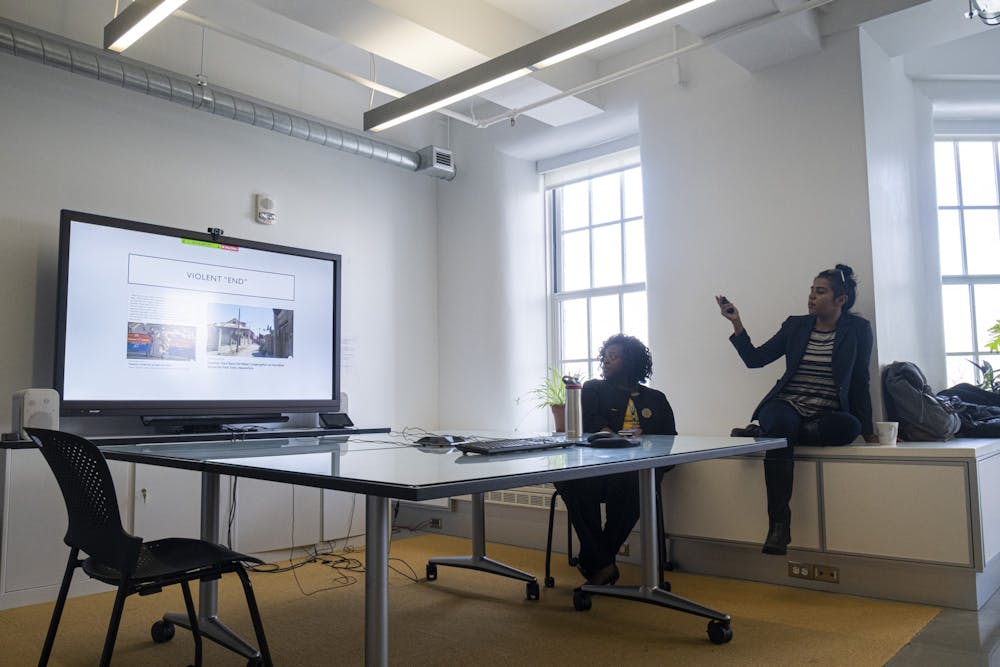Professors Kafuli Agbemenu and Shaanta Murshid discussed reproductive healthcare for African refugees and the health effects women face in regions experiencing conflict on Tuesday afternoon.
Twenty UB community members attended the presentation, New Perspectives on Women’s Health, where Murshid and Agbemenu presented on the importance of minority women’s health at Hayes Hall. Murshid, a professor in the School of Social Work, discussed her recent research on the implications of microfinance, neoliberalism and violence on women. Agbemenu, an assistant professor at the School of Nursing, discussed her research on reproductive health practices among African refugee women and how language barriers and differences in education increase their vulnerability to poor healthcare.
Agbemenu began by clarifying the difference between immigrants and refugees, saying a refugee leaves their country against their own will for safety reasons, whereas an immigrant “wants to be here.”
Of the African refugees who reside in New York, nearly 95% reside upstate, according to Agbemenu.
“In the next few years, we expect a prolific number of refugees to be resettled in the Buffalo area,” Agbemenu said.
Agbemenu’s work revolves around the reproductive health of the 23% of New York’s African refugees. Agbemenu conducted a survey of 101 African refugees residing in New York over the course of a year.
Agbemenu said 99% of American women have knowledge of various forms of contraception that are available to them but only 47.5% of African refugees had knowledge of contraception methods at their disposal. Of the African refugees who used contraception, the majority used it for birth spacing, to control their time between births, as opposed to actual long-term birth prevention.
At first, people “criticized” Agbemenu for studying African refugees as a whole, as opposed to analyzing subsects.
“I believe many people have a hard time understanding Africa is a continent and not a country, so I was fearful that any further division would complicate and dilute the potential results of my research,” Agbemenu said.
Agbemenu described her work as both “fulfilling” and “exhausting.” She ultimately blamed the language barrier as the main reason her research took so much time.
“It took a while to conduct the survey because many of these women did not speak or read English,” Agbemenu said. “Many of the women did not read or write in any language. Fortunately, I have native fluency in Swahili. That definitely expedited the process.”
Murshid’s research focuses on the on-going conflict in Kashmir, a majority-Muslim area, that is territorially contested by both India and Pakistan. There have recently been heightened tensions between Kashmir and Pakistan.
The conflict in Kashmir has had a “negative” impact on women’s mental and physical health, according to Murshid. Murshid said 41% of women in the region experience depression, 26% experience anxiety and 19% post-traumatic stress disorder.
“As we have seen recently in national and international news, the power tends to consolidate at the top,” Murshid said.
Megan Smith, an Emerson Fellow at UB’s Food Laboratory, said the presentation was an informative and unique opportunity to hear from two women of color discussing research that they were so passionate about.
“To hear from a researcher who is originally from the continent of Africa talk about her work with refugee populations in Buffalo was inspiring,” Smith said. “Her lived experience is profound and I am glad that I was able to hear her story and see the results of her research today.”
Murshid concluded the presentation by urging the audience to talk more about the topic to make the public more aware of the issues some women are experiencing.
“If we ever hope to truly ameliorate these issues and disparities, then we must begin to see the trauma that is caused by conflict as a public health concern,” Murshid said.
The news desk can be reached at news@ubspectrum.com.





